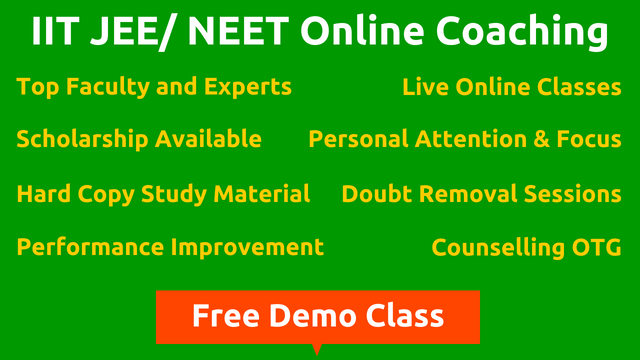
COVID-19 pandemic has changed the way students prepare for competitive exams like JEE and NEET. Online coaching replaced the traditional offline coaching classes. People who used to discard online coaching before the COVID, calling it a waste of time and a lot of distraction, were themselves studying through online classes!
Either by choice or compulsion, students and parents have realized the potential of online coaching for JEE/ NEET. When coaching institutes were closed due to COVID-19 and students were stuck at home, it was the online coaching that came to the rescue of JEE/ NEET aspirants.
Online or Offline Coaching for JEE/ NEET
In this post, we will see the comparison between online and offline coaching for JEE/ NEET, major differences, pros and cons, and which coaching to join for JEE/ NEET preparation.
Table of Content :
- Online vs Offline Coaching for JEE/ NEET – Comparison
- Difference Between Online and Offline Coaching for JEE/ NEET
- Pros and Cons of Offline Coaching for JEE/ NEET
- Advantages of Online Coaching
- Which is Better – Online or Offline Coaching for JEE/ NEET?
Online vs Offline Coaching for JEE/ NEET – Comparison
| Online Coaching | Offline Coaching |
| Classes conducted online on computer/ laptop/ mobile. | Classes conducted physically in a classroom. |
| Learn from the best JEE/ NEET teachers outside your city or state. | You will study from local teachers only. |
| You can meet your teacher virtually and can ask doubts online. | You can personally meet with your teacher and discuss your doubts. |
| Recordings of classes can be available for future reference. | Recording facility not available in offline coaching. |
| Students in the batch will be from all over the country and abroad. | Only local students will attend the coaching. |
| You can make an online study group. | You can physically interact with your peers. |
Difference Between Online and Offline Coaching for JEE/ NEET
JEE/ NEET Online coaching is not much different from offline coaching. Just like offline coaching, in online coaching, students can study from good quality teachers who explain concepts well and clear their doubts, give personal attention, be friendly and keep an eye on their performance.
Online coaching has IIT qualified teachers, students batches, regular tests, study material, test series like offline coaching. In some cases, where experienced teachers are teaching in online mode to aspirants, online coaching provides even better quality than local coaching institutes.
Note : YouTube videos and Apps are not online coaching for JEE/ NEET.
Pros and Cons of Offline Coaching for JEE/ NEET
Advantages of Offline Coaching :
- Regular classroom feeling.
- Less scope of distractions.
- Physical interaction with the teacher.
Disadvantages of Offline Coaching :
- Lack of personal attention due to large batch sizes.
- Average teachers if you don’t get the toppers batch.
- High fees (additional traveling, food, rent expenses).
- No option of recording classes.
Advantages of Online Coaching
- Online coaching is efficient, productive, time-saving, resourceful and easily accessible.
- Online coaching allows students to take classes from experienced and qualified teachers at home.
- In online coaching, the classes are recorded for future reference, so if you are absent in any class, you can watch the same class later at any time.
- Online coaching gives you a big advantage that if a good teacher is in a different city or state then you can still take classes from him/ her in online mode.
Which is Better – Online or Offline Coaching for JEE/ NEET?
Both online and offline coaching has pros and cons. Which is better for JEE/ NEET depends on the requirements of students. With online coaching, JEE/ NEET aspirants can study from top faculty and experts at home, without shifting to a hostel or another city.
The best coaching for JEE/ NEET is where the teachers clear all the doubts of the student, give personal attention to the performance and motivate him/ her to do well in the exam. This can be online or offline coaching for JEE/ NEET. After the pandemic, the bridge between offline and online coaching has diminished.
Prepare for JEE/ NEET from IIT qualified experienced teachers at the comfort of your home in Mystudycart Online Courses.
We’re listening to students.
Have something to say about this article, or any question in mind? Share it with us on Facebook or Twitter

